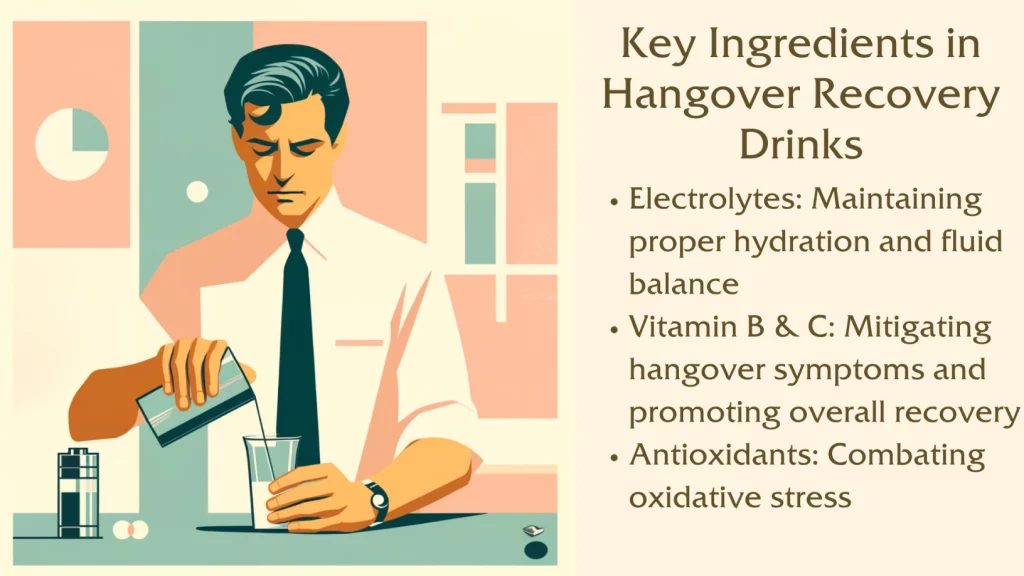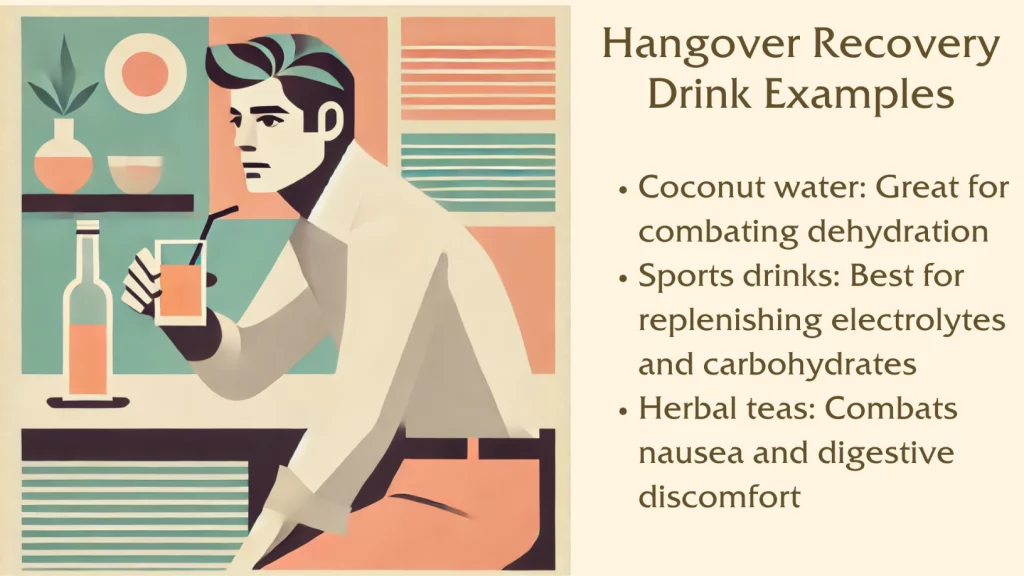Waking up after a fun night out can sometimes feel like a challenge, especially when that all-too-familiar hangover sets in. The pounding headache, relentless nausea, and overwhelming fatigue are enough to make anyone regret those extra rounds of drinks. If you’ve ever found yourself desperately searching for a remedy to bring you back to life, hangover recovery drinks might just be the solution you’ve been looking for.
These specially formulated beverages are designed to rehydrate your body and replenish essential nutrients lost during a night of drinking. Packed with electrolytes to restore balance, vitamins to boost energy, and antioxidants to combat the effects of alcohol, hangover recovery drinks are a convenient and effective way to start feeling like yourself again. Whether you’re preparing for a busy day or simply looking for relief, these drinks can be a lifesaver when you need a quick pick-me-up.
Ready to discover your new morning savior? Keep reading as we explore the best hangover recovery drinks that can help you bounce back, rehydrate, and recharge after a long night out. From tried-and-true remedies to innovative options, there’s a drink out there to suit every recovery need!
What is a Hangover Recovery Drink?
A hangover recovery drink is a specialized beverage crafted to ease the unpleasant symptoms that often follow a night of heavy drinking, such as headaches, nausea, fatigue, and dehydration. These drinks are formulated with a potent blend of electrolytes, vitamins, amino acids, and antioxidants designed to rehydrate the body, replenish lost nutrients, and support liver function, which is crucial for processing and detoxifying alcohol. By addressing these key factors, recovery drinks provide a targeted solution for mitigating hangover discomfort and speeding up the recovery process.
The ingredients in hangover recovery drinks are carefully selected for their specific benefits. Electrolytes like sodium and potassium help restore hydration and balance electrolyte levels depleted by alcohol’s diuretic effects. Vitamins, particularly B-complex and C, play a crucial role in energy production and combating fatigue, while antioxidants like glutathione or N-acetylcysteine help reduce oxidative stress and support liver health. Some drinks also include herbal extracts, such as milk thistle or ginger, known for their detoxifying and stomach-soothing properties. This combination of ingredients works synergistically to address the root causes of hangovers rather than just masking the symptoms.
For those seeking a quick and effective remedy, hangover recovery drinks offer a convenient solution that aligns with the modern, on-the-go lifestyle. They are especially appealing to individuals who need to bounce back quickly for work, social commitments, or other responsibilities. By replenishing what the body loses during alcohol consumption and supporting recovery at the cellular level, these drinks cater to a growing demand for efficient hangover relief. Choosing the right drink can make all the difference, helping you feel refreshed and ready to take on the day.
When do you need a Hangover Recovery Drink?
A hangover recovery drink can be a game-changer when dealing with the unpleasant aftermath of a night of drinking. Symptoms like headache, dehydration, nausea, and fatigue occur because alcohol depletes your body’s fluids, electrolytes, and essential nutrients. Recovery drinks are designed to tackle these issues head-on, offering a convenient and effective way to rehydrate and replenish what your body has lost. For maximum impact, they are best consumed in the morning, shortly after waking up, when your body is in the greatest need of hydration and nutrient replenishment.
These drinks work by addressing the root causes of hangovers, such as electrolyte imbalances, vitamin deficiencies, and dehydration. Ingredients like potassium, magnesium, and sodium restore electrolyte levels, while vitamins B and C help boost energy and support metabolic functions. Some recovery drinks also include antioxidants and liver-supporting compounds like N-acetylcysteine or milk thistle to help your body detoxify more efficiently. By providing targeted support, they not only alleviate immediate discomfort but also help you recover faster, making them particularly useful when you have a busy day ahead.
For individuals seeking quick relief, hangover recovery drinks align perfectly with the need for immediate and efficient solutions. Whether you’re heading to work, attending an event, or simply wanting to feel better fast, these beverages provide a practical and easy way to bounce back. By replenishing your body’s reserves and restoring balance, they enable you to regain energy and focus, ensuring you’re ready to take on whatever the day has in store.
What are the Key Ingredients in Effective Hangover Recovery Drinks?
Effective hangover recovery drinks are carefully formulated with key ingredients that target the root causes of hangover symptoms. Electrolytes like sodium, potassium, and magnesium play a crucial role in rehydrating the body and restoring electrolyte balance, which is often disrupted due to alcohol’s diuretic effects. Replenishing these essential minerals helps reduce headaches, fatigue, and muscle cramps caused by dehydration. Additionally, vitamins—particularly B-complex and vitamin C—are vital for energy production, immune system support, and overall recovery. The B vitamins help the body metabolize alcohol more effectively, while vitamin C acts as a powerful antioxidant to reduce inflammation and boost detoxification.

Antioxidants are another critical component of recovery drinks, helping to combat oxidative stress caused by alcohol consumption. Ingredients like flavonoids, glutathione, and N-acetylcysteine support the liver in breaking down toxins and protecting cells from damage. Some formulations may also include herbal extracts like milk thistle or ginger, which aid digestion and enhance liver health. Together, these ingredients create a comprehensive approach to hangover relief, addressing dehydration, nutrient depletion, and oxidative damage in one convenient solution. This combination makes recovery drinks an effective choice for those looking to bounce back quickly and restore their well-being.
Electrolytes like Sodium and Potassium
Electrolytes such as sodium and potassium are essential for maintaining proper hydration and fluid balance in the body, which is critical when recovering from a hangover. Alcohol acts as a diuretic, increasing urination and causing the body to lose essential electrolytes, leading to dehydration. This dehydration often manifests as fatigue, dizziness, headaches, and muscle weakness. Recovery drinks fortified with sodium and potassium work to restore these depleted electrolytes, rehydrating the body and alleviating these symptoms. Sodium helps the body retain water and ensures proper nerve and muscle function, while potassium regulates fluid balance and supports healthy blood pressure levels.
By replenishing these electrolytes, hangover recovery drinks support vital physiological functions, including energy metabolism and cardiovascular health. A balanced electrolyte profile is essential for the body to perform optimally, and these drinks help bridge the gap caused by alcohol-induced losses. The inclusion of sodium and potassium not only aids in physical recovery but also enhances mental clarity and focus, helping you feel better faster after a night of heavy drinking.
Vitamins such as B and C
Vitamins B and C play crucial roles in mitigating hangover symptoms and promoting overall recovery. The B vitamins, including B1 (thiamine), B6, and B12, are particularly important for energy production and brain function. Alcohol depletes the body’s stores of these water-soluble vitamins, which can result in fatigue, confusion, and a lack of focus. Supplementing with B vitamins through recovery drinks helps restore these levels, improving energy, mood, and cognitive function. B6, in particular, has been shown to reduce the severity of hangover symptoms by supporting the metabolism of alcohol byproducts like acetaldehyde.
Vitamin C, on the other hand, is a powerful antioxidant that strengthens the immune system and aids the liver in detoxifying harmful substances. It neutralizes free radicals generated during alcohol metabolism, reducing inflammation and oxidative stress. This helps to alleviate symptoms like headaches and nausea while supporting faster recovery. Together, vitamins B and C work synergistically to replenish nutrients, boost energy, and enhance the body’s ability to repair itself after alcohol consumption, making them indispensable in any effective hangover recovery formula.
Antioxidants including Flavonoids
Antioxidants, such as flavonoids, play a critical role in hangover recovery by combating oxidative stress and inflammation caused by alcohol consumption. When alcohol is metabolized, it generates harmful free radicals that can damage cells and tissues, contributing to symptoms like fatigue, headaches, and nausea. Flavonoids and other antioxidants neutralize these free radicals, protecting cells from oxidative damage and reducing inflammation. This process supports the body’s natural healing mechanisms, making recovery faster and more efficient.
In addition to their protective properties, antioxidants also support liver function, which is essential for breaking down and eliminating toxins. Compounds like glutathione and N-acetylcysteine, often included in recovery drinks, work alongside flavonoids to enhance the liver’s detoxification capacity. By supporting this critical organ, antioxidants help reduce the toxic effects of alcohol on the body, alleviating symptoms and restoring balance. Their inclusion in hangover recovery drinks provides a holistic approach to healing, addressing not just immediate discomfort but also the underlying cellular damage caused by excessive drinking.
How do Electrolytes Help in Hangover Recovery?
Electrolytes are essential for hangover recovery, as they replenish the vital minerals lost due to alcohol’s dehydrating effects. Alcohol acts as a diuretic, increasing urine production and causing the body to lose electrolytes like sodium and potassium, which are critical for maintaining fluid balance. This loss can lead to symptoms such as fatigue, dizziness, muscle cramps, and headaches. Sodium helps the body retain water and restore hydration levels, while potassium plays a crucial role in regulating fluid balance, nerve signals, and muscle contractions. Together, these electrolytes work to rehydrate the body, reduce discomfort, and restore physical energy after a night of drinking.
By supporting normal muscle and nerve function, electrolytes also help alleviate the sluggishness and weakness that often accompany a hangover. Their ability to quickly rehydrate the body and restore balance makes them a cornerstone of effective hangover recovery drinks. For individuals seeking fast and efficient relief, drinks fortified with sodium, potassium, and other key electrolytes provide a practical solution to replenish lost minerals and improve overall well-being, helping them feel more energized and ready to take on the day.
Why are Vitamins Essential in Hangover Recovery Drinks?
Vitamins play a pivotal role in hangover recovery drinks, helping to replenish nutrients that are often depleted by alcohol consumption. Vitamin B, particularly B1 (thiamine), B6, and B12, is essential for energy production and cognitive function. Alcohol interferes with the body’s absorption and storage of these water-soluble vitamins, leading to symptoms like fatigue, brain fog, and irritability. Recovery drinks fortified with B vitamins help restore these critical nutrients, improving energy levels, mood, and focus. B6, in particular, has been shown to reduce the severity of hangover symptoms by aiding in the metabolism of acetaldehyde, a toxic byproduct of alcohol.
Vitamin C is another crucial component of effective recovery drinks, known for its antioxidant and immune-boosting properties. It helps combat oxidative stress caused by alcohol metabolism and supports the liver in detoxifying harmful substances. By neutralizing free radicals and reducing inflammation, Vitamin C alleviates symptoms like headaches and nausea while promoting overall cellular recovery. Together, these vitamins work synergistically to support metabolic processes, reduce the duration and intensity of hangover symptoms, and improve overall well-being. Their inclusion in recovery drinks offers a holistic and efficient solution for individuals looking to feel better faster after a night of drinking.
What Role do Antioxidants Play in Alleviating Hangover Symptoms?
Antioxidants are a key component in hangover recovery drinks, offering vital protection against the oxidative stress caused by alcohol metabolism. When alcohol is broken down in the body, it generates free radicals—unstable molecules that can damage cells, tissues, and organs. This oxidative stress contributes to inflammation, fatigue, headaches, and other common hangover symptoms. Antioxidants work by neutralizing these free radicals, reducing cellular damage and inflammation. This protective action not only alleviates immediate discomfort but also supports the body’s natural healing and detoxification processes, helping you recover faster.
The inclusion of antioxidants in recovery drinks goes beyond hangover relief, promoting overall health and well-being. Compounds like flavonoids, glutathione, and vitamin C are particularly effective, as they support liver function and enhance the body’s ability to process and eliminate toxins. By addressing the root cause of oxidative stress, these antioxidants help restore balance to the body and reduce the severity of hangover symptoms. For those seeking comprehensive and effective solutions, antioxidant-rich recovery drinks provide a holistic approach to feeling better and supporting long-term health.
4o
What are Some Popular Hangover Recovery Drinks?
Popular hangover recovery drinks like coconut water, sports drinks, and herbal teas offer a variety of solutions for alleviating hangover symptoms. Coconut water is a natural hydrator packed with electrolytes such as potassium and magnesium, which are essential for replenishing the minerals lost due to alcohol’s diuretic effects. Its light, refreshing taste makes it easy to consume, even when dealing with nausea or fatigue. Unlike sugary options, coconut water provides hydration without overwhelming the body, making it a gentle yet effective choice for rebalancing fluids and electrolytes.

Sports drinks, on the other hand, combine electrolytes with a dose of sugars to provide both rehydration and an energy boost. Drinks like Gatorade or Pedialyte are formulated to restore the body’s electrolyte balance while replenishing glycogen stores, which can be depleted after a night of drinking. The added sugars offer quick energy to combat fatigue, while flavors make them a palatable option for many. These drinks are particularly useful for individuals looking for a faster recovery when they have a busy day ahead and need to restore hydration and energy levels quickly.
For those experiencing nausea or digestive discomfort, herbal teas such as ginger or peppermint can be a soothing remedy. Ginger tea is known for its anti-inflammatory and stomach-settling properties, making it effective for reducing nausea and calming an upset stomach. Peppermint tea, meanwhile, aids digestion and offers a cooling, relaxing effect that can alleviate queasiness. These teas provide a warm, comforting alternative to cold recovery drinks and cater to those seeking natural remedies for hangover symptoms. Together, these popular drinks address a wide range of hangover effects, offering diverse and effective solutions for recovery.
Coconut Water for Hydration
Coconut water is a natural and effective solution for combating dehydration, one of the primary causes of hangover symptoms. Packed with essential electrolytes like potassium, magnesium, and sodium, it helps restore the body’s fluid balance more effectively than plain water. These electrolytes are vital for maintaining nerve and muscle function, as well as regulating blood pressure, which can be disrupted after alcohol consumption. Coconut water’s natural sugars provide a gentle energy boost, making it a refreshing option for rehydration without the heaviness of sugary sports drinks.
In addition to its rehydrating properties, coconut water is low in calories and free from artificial additives, making it a healthier choice for those conscious of their intake. Its light, mildly sweet flavor is easy to sip on, even when dealing with nausea or an upset stomach. For individuals seeking a natural and nutrient-rich recovery drink, coconut water offers a wholesome way to alleviate hangover-related dehydration and restore vitality.
Sports Drinks with Electrolytes
Sports drinks like Gatorade or Pedialyte are specifically designed to replenish electrolytes and carbohydrates, making them a go-to option for hangover recovery. Alcohol consumption depletes the body of essential minerals such as sodium and potassium, which are crucial for hydration and energy production. Sports drinks not only replace these lost electrolytes but also include simple sugars that help restore glycogen levels, providing an energy boost to combat fatigue. The combination of salts and sugars enhances fluid absorption in the body, making these drinks a fast-acting remedy for dehydration.
What sets sports drinks apart is their versatility and accessibility. With a wide variety of flavors and formulations, they cater to diverse preferences while delivering the nutrients needed to recover. Some brands even offer low-sugar or electrolyte-focused options for those looking for a tailored solution. Whether consumed during a hangover or as a preventative measure after drinking, sports drinks are a reliable choice for quickly restoring balance and relieving hangover symptoms.
Herbal Teas like Ginger or Peppermint
Herbal teas such as ginger and peppermint are gentle yet powerful remedies for hangover symptoms, particularly nausea and digestive discomfort. Ginger tea, renowned for its anti-inflammatory and stomach-soothing properties, can help alleviate queasiness and reduce inflammation caused by alcohol consumption. It promotes better digestion and calms the gastrointestinal tract, providing relief from the bloating and discomfort often associated with hangovers. Ginger also supports blood circulation, which can aid in faster recovery and improved energy levels.
Peppermint tea offers a cooling and relaxing effect, making it another excellent choice for hangover recovery. Known for its ability to relax the muscles of the digestive tract, peppermint tea helps reduce stomach cramps and nausea. Its refreshing aroma can also ease headaches and promote mental clarity. Together, these herbal teas provide a natural and calming approach to managing hangover symptoms while supporting overall well-being, making them a comforting addition to any recovery routine.
How does Coconut Water Aid in Hangover Recovery?
Coconut water aids in hangover recovery by providing a natural source of electrolytes such as potassium and sodium, which help rehydrate the body and restore fluid balance. Its natural sugars and minerals replenish nutrients lost through alcohol consumption, alleviating symptoms like dehydration and fatigue. As a low-calorie beverage, coconut water offers a healthier alternative to sugary drinks, making it an appealing choice for individuals seeking effective and natural hangover relief.
Why are Sports Drinks Recommended for Hangover Recovery?
Sports drinks are recommended for hangover recovery because they contain a blend of electrolytes and carbohydrates that help restore fluid balance and boost energy levels. The electrolytes, such as sodium and potassium, replenish minerals lost through dehydration, while the carbohydrates provide a quick energy source. This combination helps alleviate symptoms like fatigue and dizziness, making sports drinks an effective option for those seeking rapid relief from hangover effects.
Their formulation is designed to enhance absorption, ensuring efficient rehydration and recovery.
What Benefits do Herbal Teas Offer for Hangover Symptoms?
Herbal teas offer several benefits for alleviating hangover symptoms due to their soothing and anti-inflammatory properties. Teas like ginger and peppermint can help reduce nausea and digestive discomfort, common symptoms after alcohol consumption. Ginger tea is known for its ability to ease stomach upset and reduce inflammation, while peppermint tea can relax the digestive tract and provide a calming effect.
These natural remedies support the body’s recovery process, making herbal teas a gentle and effective option for those seeking relief from hangover effects.
Are There Any Homemade Hangover Recovery Drink Recipes?
Yes, there are several homemade hangover recovery drink recipes that can provide effective and natural relief from symptoms like dehydration, nausea, and fatigue. One popular choice is lemon and honey water, a simple yet powerful combination that replenishes fluids and nutrients. Lemon juice, rich in vitamin C, helps support the immune system and aids the liver in detoxifying alcohol byproducts. Honey provides a gentle source of natural sugars, boosting energy levels and stabilizing blood sugar, which can drop after a night of drinking. Together, these ingredients create a hydrating and refreshing drink that soothes the body while promoting recovery.
Another excellent homemade remedy is ginger and turmeric tea, known for its potent anti-inflammatory and antioxidant properties. Ginger is widely recognized for its ability to reduce nausea and calm an upset stomach, making it especially helpful for hangover-related queasiness. Turmeric, on the other hand, contains curcumin, a compound that supports liver health and combats oxidative stress caused by alcohol consumption. Brewed together in a warm tea, ginger and turmeric work synergistically to alleviate discomfort, reduce inflammation, and help the body detoxify more effectively.
These homemade recovery drinks offer a natural and accessible solution for managing hangover symptoms with ingredients commonly found at home. Not only are they simple to prepare, but they also avoid the artificial additives often found in commercial recovery products. Whether you’re sipping on lemon and honey water to rehydrate or enjoying a soothing cup of ginger and turmeric tea, these remedies provide a holistic approach to feeling better and getting back on your feet after a night of indulgence.
Lemon and Honey Water
Lemon and honey water is a simple yet effective homemade remedy for hangover recovery. The lemon provides vitamin C and antioxidants that support the immune system and detoxification, while honey adds natural sugars that boost energy levels and soothe the throat. This combination helps rehydrate the body and alleviate symptoms like fatigue and dehydration, offering a refreshing and revitalizing start to the day.
Ginger and Turmeric Tea
Ginger and turmeric tea is renowned for its anti-inflammatory and antioxidant properties, making it an excellent choice for easing hangover symptoms. Ginger helps reduce nausea and digestive discomfort, while turmeric supports liver function and detoxification. Together, they create a powerful blend that aids in reducing inflammation and promoting overall recovery, providing a natural and comforting solution to alleviate hangover effects.
What Should be Avoided in Hangover Recovery Drinks?
In hangover recovery drinks, avoiding certain ingredients is just as important as including the right ones. Two common culprits to steer clear of are caffeine and excessive sugar, both of which can worsen hangover symptoms rather than alleviate them. While caffeine might provide a temporary boost in alertness, it is a diuretic that can exacerbate dehydration—a primary cause of headaches, fatigue, and other hangover woes. Consuming caffeine in recovery drinks may leave you feeling worse in the long run by further depleting your body’s fluid levels, making it counterproductive for rehydration.
Excessive sugar is another ingredient to avoid in hangover recovery drinks. High sugar content can lead to blood sugar spikes followed by rapid crashes, intensifying feelings of fatigue, nausea, and dizziness. After alcohol consumption, the body is already dealing with fluctuating blood sugar levels, and sugary drinks can compound this problem, delaying recovery. Additionally, too much sugar can interfere with the body’s ability to absorb essential nutrients and electrolytes, reducing the overall effectiveness of a recovery drink.
By avoiding caffeine and excessive sugar, hangover recovery drinks can focus on what truly matters: rehydrating the body, replenishing lost nutrients, and supporting detoxification. Opting for drinks with balanced electrolytes, vitamins, and natural, low-sugar ingredients ensures a more effective and health-conscious solution. This approach aligns with the needs of individuals seeking comprehensive and efficient relief, allowing them to recover faster and feel better without unintended setbacks.
Caffeine
Caffeine should be avoided in hangover recovery drinks because it acts as a diuretic, which can lead to further dehydration. This exacerbates hangover symptoms like headaches and fatigue, making recovery more difficult. Although caffeine may provide a temporary energy boost, its dehydrating effects can ultimately hinder the body’s ability to recover effectively.
Choosing caffeine-free options supports better hydration and overall recovery.
Excessive Sugar
Excessive sugar in hangover recovery drinks can cause rapid blood sugar spikes followed by crashes, worsening symptoms such as nausea and dizziness. High sugar content can also lead to increased calorie intake without providing essential nutrients needed for recovery. Opting for drinks with minimal sugar helps maintain stable energy levels and supports a more balanced recovery process, promoting sustained well-being throughout the day.
How Soon Should One Consume a Hangover Recovery Drink After Waking Up?
It is advisable to consume a hangover recovery drink as soon as possible after waking up to maximize its effectiveness. Early consumption helps quickly address dehydration and nutrient depletion, common causes of hangover symptoms such as headaches and fatigue. By promptly replenishing lost fluids and essential nutrients, these drinks can expedite the recovery process and restore energy levels, aligning with the search intent of individuals seeking immediate relief from hangover effects.
Can Hangover Recovery Drinks Prevent Future Hangovers?
Hangover recovery drinks cannot prevent future hangovers, as they primarily address symptoms after alcohol consumption. They work by replenishing electrolytes, vitamins, and antioxidants to alleviate immediate effects like dehydration and fatigue. While these drinks support recovery, preventing hangovers requires responsible drinking habits, such as moderating alcohol intake and staying hydrated.
Understanding this distinction helps individuals manage expectations and focus on proactive strategies for reducing hangover risks.
What are the Limitations and Side Effects of Hangover Recovery Drinks?
Hangover recovery drinks have limitations and potential side effects. They may not fully alleviate all hangover symptoms, as their effectiveness varies depending on individual factors like alcohol tolerance and overall health. Some drinks contain high sugar or caffeine levels, which can lead to dehydration or blood sugar fluctuations, exacerbating symptoms like nausea or jitters.
Additionally, relying solely on these drinks may overlook the importance of responsible drinking habits. Understanding these limitations helps individuals make informed choices and incorporate recovery drinks as part of a broader strategy for managing hangovers.
How do Hangover Recovery Drinks Compare to Other Remedies?
Hangover recovery drinks offer a convenient and targeted approach to alleviating symptoms compared to other remedies. They provide a quick source of electrolytes, vitamins, and antioxidants specifically formulated to address dehydration and nutrient depletion. While traditional remedies like rest, hydration with water, and balanced meals also support recovery, hangover drinks can expedite symptom relief.
However, their effectiveness may vary, and they should be used alongside responsible drinking practices for optimal results. Understanding these comparisons helps individuals choose the most suitable strategy for managing hangover effects.
What are the Best Practices for Using Hangover Recovery Drinks?
The best practices for using hangover recovery drinks involve timing, moderation, and complementing them with other recovery strategies. Consuming these drinks soon after waking up maximizes their effectiveness by quickly addressing dehydration and nutrient loss. It’s important to choose drinks with balanced ingredients, avoiding excessive sugar and caffeine.
Pairing recovery drinks with adequate rest, hydration with water, and a nutritious meal can enhance recovery. These practices ensure a comprehensive approach to managing hangover symptoms, aligning with the search intent of individuals seeking efficient and holistic relief.





